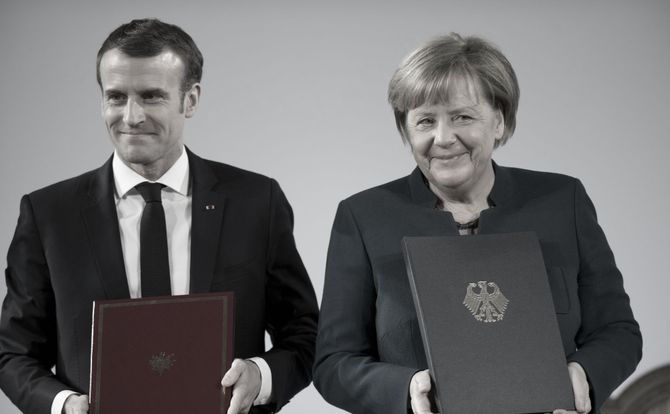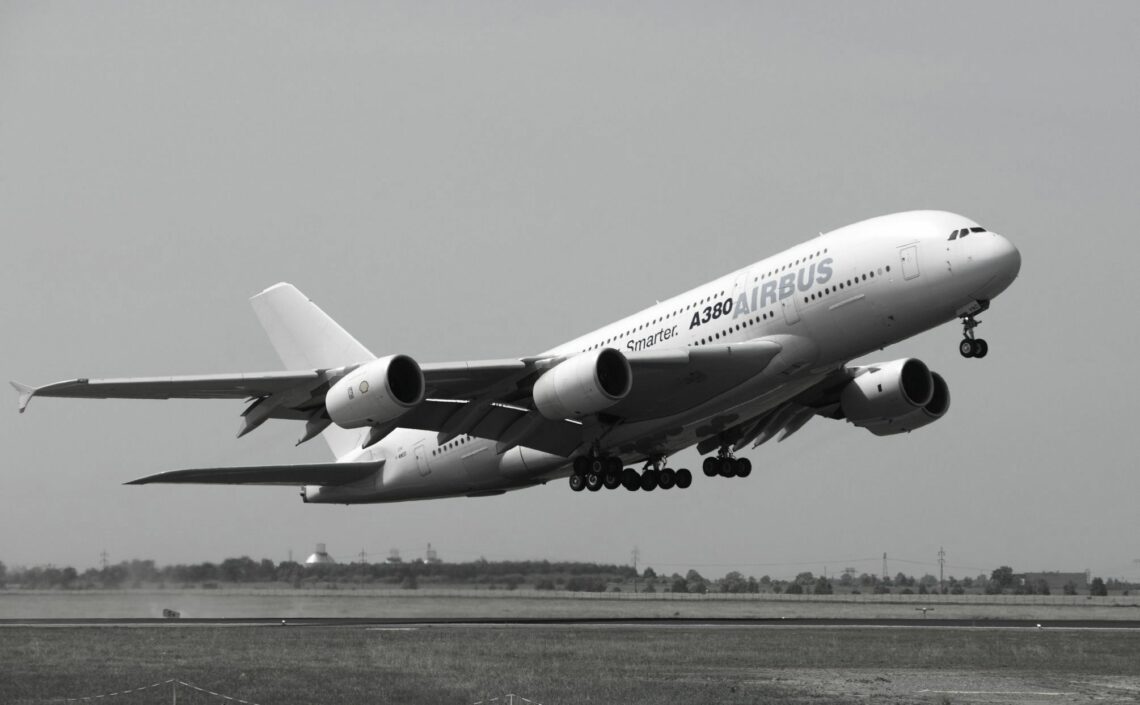The overhauled but directionless Franco-German tandem
When President Macron and Chancellor Merkel signed a new Franco-German treaty in Aachen, the outcome was underwhelming. The ambitious goals that were set also seem unrealistic. That means fears of a dominant Franco-German tandem in the EU are unfounded as well as hopes that it will lead the bloc out of its doldrums.

In a nutshell
- The new Franco-German treaty sets lofty goals that are unlikely to be met
- In economic, foreign and defense policy, the two countries are moving apart
- This means the partnership will neither dominate nor lead the European Union
Earlier this year, French President Emmanuel Macron and German Chancellor Angela Merkel signed a new Franco-German treaty in Charlemagne’s old imperial capital of Aachen. The treaty was meant to be an overhaul of the truly historic Elysee Treaty, signed in 1963 by Konrad Adenauer and Charles de Gaulle, a milestone of Franco-German reconciliation and cooperation.
However, this year’s 16-page agreement may only provide a footnote in modern European history. Most of it reflects what was already common practice between Germany and France; the rest is long on aspirations but short on credible commitments.
The most detailed parts concern further regional cooperation along the Franco-German border, with the innovative idea of giving border regions a choice of regulations and jurisdictions in joint projects.
Among the agreement’s more obscure proposals is the creation of a “Franco-German economic area,” with harmonized laws and taxes for businesses that would go beyond common European Union rules. However, Chancellor Merkel cautioned that this portion of the treaty refers to a long-term project.
There is plenty of dissonance between ambition and reality in the treaty.
The document does not mention President Macron’s proposals for eurozone reform, which would see Germany paying billions more euros into a separate eurozone budget, spent by a (preferably French) eurozone minister under the orders of a eurozone parliament’s (Southern) majority. It now seems that only a small portion of the EU budget will be designated for anticyclical spending within the eurozone.
Reality bites
There is also plenty of dissonance between ambition and reality in the treaty when it comes to enhanced foreign and defense policy cooperation. Several recent examples illustrate the ongoing divergence or even irrelevance of these ambitions.
For example, in response to President Macron’s frequent calls for unity in European foreign policy, Germany invited France to convert its permanent seat on the United Nations Security Council into one that represents the entire European Union. Berlin never seriously expected Paris would ever make such a move. The Aachen treaty now says that France would support Germany receiving a permanent seat, but both countries’ leaders know full well that Russia and China would never support another Western European nation joining the five-strong club.
The Aachen treaty also expresses the countries’ desire to “develop a common approach for arms exports.” That goal is laudable, but unlikely when one looks at the specifics. What about Saudi Arabia? Germany blocked arms exports to the Saudis after the Jamal Khashoggi affair, France did not. Berlin and Paris also agreed to develop a next-generation fighter jet together. But France insists on guarantees that exports will not be restricted before it participates in any further financing of the project. Germany cannot offer such promises.

A key participant in the project is Airbus, the most prominent example of European industrial policy led by Germany and France. Recently, the company declared that its signature project, the A380 wide-bodied airliner, will cease production due to lack of demand. While some may declare Airbus a brilliant example of how Franco-German industrial policy on a grand scale can fend off a dominant American company (Boeing), others call it a colossal demonstration of inefficient policy interference and a waste of taxpayers’ money.
Another Franco-German industrial policy prestige project was effectively blocked by the European Commission’s competition authority: the merger of Siemens’ and Alstom’s rail businesses, which was supposed to create a globally competitive “Airbus on rails.”
Fears that the Franco-German alliance may become too dominant seem unfounded.
Yet another example of Franco-German misalignment has been the Nord Stream 2 episode. Here, Germany has tried to play its own national card in industrial and energy policy.
The German government was banking on France’s help in blocking a stricter EU directive that would put gas supply under EU law, including any bilateral commercial contract between Germany and Russia. However, France is backing the EU directive, which will therefore go into effect. As such, Gazprom will be able to deliver gas via the Baltic Sea directly to Germany, but under strict provisions of “unbundling” ownership of the pipes and the supply of gas. Gazprom would have to sell its pipeline to a third party and would no longer be able to engage in monopolistic price discrimination: giving favorable rates to friends and punishing foes with higher prices.
Wobbly partnership
A final example of Franco-German disunity relates to deeper political and cultural differences that lofty treaties are unlikely to erase.
Berlin wants the EU to reach a quick agreement with the United States on industrial tariffs (not least on car exports), like what European Commission President Jean-Claude Juncker managed to wrest out of U.S. President Donald Trump last year.
Paris, however, very much prefers not to talk trade before the elections to the European Parliament in May. A unanimous mandate of all EU states is needed before the EU’s trade commissioner, Cecilia Malmstrom, can begin negotiations. The unelected Yellow Vests on the streets of France will most likely have more influence on the French government than ministerial colleagues in dark suits from Berlin. And President Trump certainly does not care about the European election calendar when planning his trade policy agenda.
At Aachen, there was much talk about the new Franco-German tandem, the vehicle that had steered European politics since the 1950s and well into the end of last century – with the common currency as its last major common milestone. Since then, however, the tandem has wobbled and stalled.
The fears of mostly Eastern European politicians (including European Council President Donald Tusk) that the Franco-German alliance may become too dominant and exclude their interests inside the EU after Brexit seem unfounded. But the same is true for the hopes of others that the overhauled Franco-German tandem will lead the EU toward new horizons.








